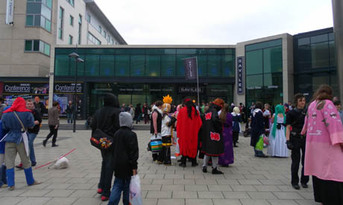
I attended Thought Bubble in Leeds this year. In between getting all my favourite comics artists and writers to sign various things, and chatting to Robert Llewelyn while dressed as Holovirus Rimmer, I attended two panels to get some scoop on what’s coming up for Marvel.
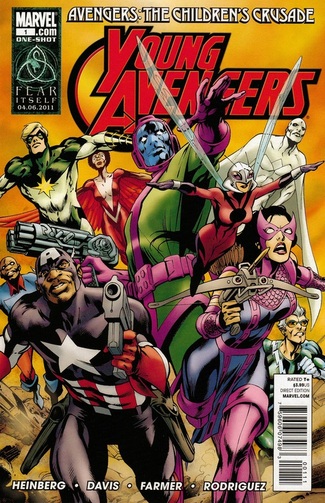
We discovered that the final issues of Young Avengers focus on various characters, and all take place on one night in a nightclub. Vieceli’s story will focus on an unrevealed character, while Christian Ward will take on Miss America, Annie Wu will continue her work with Kate Bishop over from Hawkeye, Becky Cloonan is the artist for Marvel Boy’s story, Ming Doyle handles Loki, and Joe Quinones is also a mystery, nor was McKelvie’s character revealed. It makes sense that they’ll be tackling Wiccan, Hulkling, and Prodigy between them.
While I can’t report the specifics of what were discussed due to spoilers, and anything that wasn’t spoilerific made no sense out of context, I can share with you some revelations from the Q and A section.
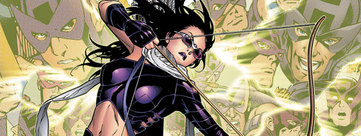
Gillen: It’s always a question of who gets to kill her. [laughs] It’s fine. Both Hawkeye and Young Avengers were books by design made to stand alone as a singular aesthetic object. So I talked to Matt about what my plans where and he talked about his. Matt said, “she’s kind of your character” and whilst she appears more in Hawkeye, when we’re doing Young Avengers, she’s a Young Avenger, and what you choose to do there is important. So we had overlapping but contrasting things. You get a different sense of Kate when she’s in a team versus Kate when she’s off with Hawkeye, I think. Context generally changes what bits of a character you show, only by the amount of attention you get to pay to them.
You’re winding this up at #15, so do you think that allows for better storytelling, to have a shorter story, with a beginning, middle and end that you control?
McKelvie: I like it when it happens. That was our plan with this story. They asked us if we wanted to carry on. We didn’t think that long about it. We did the story we wanted to do and they let us do it, which was great. A lot of the time when they want to carry on, they get a new team in. They just felt it was the right thing to do.
Gillen: One thing I’ve never done at Marvel is a story, with a beginning, middle, end, without any crossovers or any larger interference or whatever, in that I’ve always been dancing with a crossover or dancing to support a crossover, and I was aware when I’d never done with Immortal Iron Fist, or FF…
McKelvie: Everything I’ve done at Marvel apart from Defenders that I took over from Terry Dodson, everything I’d done was part of a bigger story. We started it, and we ended it.
Gillen: Unlike crossover events in the Marvel universe, it can be picked up itself and read as a thing. That’s kind of the idea. And also, the idea was quite fun, in that we started in January, ended in December, well, first week of a new year, with a story that was set off in the new year, that’s kind of fun. It’s very rare that you get chance to do something that is a bit playful with the world like that so we embraced that every chance we got. We’ve very lucky, in that we didn’t want to turn it into a normal book, not that there’s anything wrong with being a normal superhero book, but we felt that we had the chance to do something a little unusual.
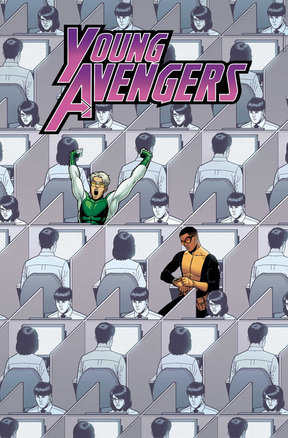
Gillen: It’s tricky, especially with something like this. You try to give at least a couple of moments per issue where a character does something interesting. When you have an issue where a character is deliberately hanging back, something like issue #11 with Prodigy, that’s the way you have to work it. In telling the story, there’s definitely characters that are the A-plot and the B-plot, the way the story is constructed, and when issue #15 happens, you’ll be able to go “oh, that was the B-plot, that was the A-plot”, they dovetail and complement one another, in terms of the number of characters. I’m not saying we get it right, the team works with who leads at any given moment. Yes, it’s difficult.
One of the great things about the book is the diversity of the cast. How do you feel about letting go of the characters, with the fear of them being ret-conned as less diverse?
Gillen: Marvel at the moment, they have a commitment… there’s editors who definitely give a toss, that’s the best way of putting it. So in terms of the people who are generally care-taking the characters, the people are aware of what it is. They encourage anything we want to do with the Young Avengers. I wanted a quite diverse cast. I wanted to push some things that hadn’t been seen in mainstream superhero comic books. As far as I’m concerned, they aren’t controversial. Being natural was very important to Young Avengers. All you can really do in a book like this is actually see what sticks. It’s always a question of what artists care about what you’ve done, what they choose to take on or not. You can’t force a writer to write about something they’re not interested in, and a lot of people are interested in what we do in Young Avengers.
The next question was slightly spoilery, but Gillen indicated that there will be a playlist accompanying the last issues of Young Avengers, which take place in a nightclub, but not necessarily what is playing at any one time. In any case, for some songs, it will be evident in the panels what is playing. You would see from what songs would make certain characters dance. “Dancing to Hot in Herre is a lot different to dancing to Dancing Queen.”
Are there any more plans with Marvel for more Young Avengers any time soon, or will this be the end of it for now?
Gillen: I was gonna make a really bad joke and say “oh no, they’re dead now” but I thought you might literally tear me apart.
McKelvie: I’m not gonna defend you.
Gillen: I don’t know of any specific time-table. It would surprise me if they weren’t going to do any more. When we said “we’ve had enough, we’ve done what we wanted to do” they said, “yeah, okay, it’s always been kind of like seasons. Rather than get another writer on immediately, we can give it a chance to stew and come back. I think sooner rather than later, but that’s just a gut feeling.
Were there any discussions about certain characters “getting off” with each other?
McKelvie: Tell them the funny story.
Gillen: Okay, especially because it’s at a party, that changes the interaction a little. However, I sent everyone a description with “here’s a load of ideas that could be fun.” I wrote, “oh, how about Lyra getting off with Skaar?” until I thought, “they’re cousins. Kieron, no incest is allowed in the comics.” So that was accidental incest. If there’s a long-standing relationship, I’m not gonna have somebody suddenly start cheating. The difference between a flirtation between two characters and something more is…it’s all very natural.
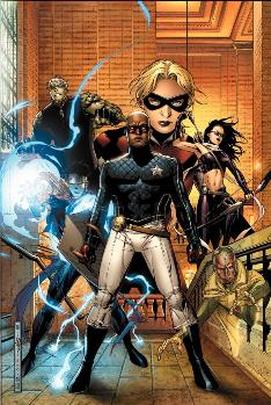
Gillen: How on earth do you define controversy? [the person asking the question brings up Kate Bishop having sex with Marvel Boy in the first issue] Different people have different reservations, and different reservations can be fair. I’m not very comfortable grouping everybody who has a problem with a series into one. But if you’re writing complicated humans who are written internally, I try to write scenes more clearly, with emotional decisions and character development in the background for a reason. I’m also writing them as opposed to a general idea of them. Something that may be controversial…isn’t. It doesn’t bother us at all. The reason why I wrote that first page is it made sense. We were very up-front with what we were doing. If Marvel told us I couldn’t write that, I’d find another book. That’s a very soft test of, “are we going to be able to do the sort of superhero, but relatively authentic teenage book?” and if we can’t then we don’t want to do it. Probably, Young Avengers goes too coy if anything. I think most teenage comic books are relatively tame compared with most teenage young adult fiction. It’s the fact we’ve got visuals. I wouldn’t say controversial. Put it another way, if a homophobe really hates what I’m doing in a book, I’m quite happy about it.
Later came the Marvel writer’s panel, hosted by Marvel senior editor Stephen Wacker and Senior Vice President CB Cebulski, and featuring a return of Gillen, Hawkeye artist David Aja, Avengers Assemble and Captain Marvel scribe Kelly Sue DeConnick, X-Force’s Simon Spurrier, Wolverine and Doctor Who writer Paul Cornell, and a little late, Hawkeye writer Matt Fraction (laden with coffee), and Uncanny X-Force artist Ramon Perez. This panel was pure Q and A, and it was interesting to see the interaction of the different panellists, and how their own ways of thinking were reflected in their work. DeConnick was fun but also quite philosophical, while Gillen continued his trend of cracking jokes about killing Jamie McKelvie. And David Aja was surprisingly foul-mouthed.
What’s the most difficult thing about making comics?
Wacker: Pronouncing Kieron Gillen correctly.
Gillen: I think the hardest thing is answering this question.
DeConnick: Meeting a deadline.
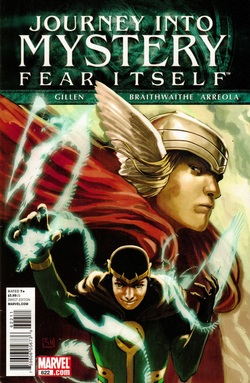
Soon, the conversation spun off to discuss the infamous ‘Pizza Dog’ issue of Hawkeye. First, Fraction and Aja clarified that the issue, from the perspective of Clint Barton’s dog Lucky, began as a joke, but one that spiralled out of control until it was too late to stop it. The issue was intended to give Aja a break from his highly-stylised design, and was intended to be a mostly-text issue, but evolved in production to feature barely any text at all, using icons and symbols instead. Eventually, this led to Aja emailing Fraction on vacation with a panicked, “Quick, need to know. What does everybody in the building smell like?”
When asked about how he pitched Hawkeye, Fraction discussed a comic he’d written for GQ about the assassination of Osama bin Laden, and with all that research still in his head, he pitched an idea of an assassination attempt on bin Laden involving Hawkeye. This eventually became the two-parter ‘The Tape’, but minus Osama. Following a re-pitch, Wacker said the editorial team basically let Fraction, Aja and everyone else involved do what they wanted, but that may be more subterfuge on behalf of the writers. Both Fraction and Gillen (discussing Journey Into Mystery) admitted that they pitched on the strength of their characters, keeping the odder elements of their books, like Pizza Dog, quiet. Fraction also mentioned that, while previous Hawkeye series hadn’t landed well with fans, he knew he had his series with the image of Clint with a bandage on his nose.
More worry for the safety of Jamie McKelvie came when the panel were asked about the most rewarding aspect of making comics. “That I know someday Jamie will die” came his first answer. He later, more seriously, admitted that it was knowing that these characters meant as much to fans as they do to him. He spoke of seeing people dressed up as Young Avengers, and how wonderful that was. Fraction then took this sentimentality and ran with it, saying the best thing was “you”, indicating the audience. He agreed that seeing people dressed as Kate Bishop, Clint Barton, Carol Danvers and others meant that, yeah, the books had an audience, but by them showing up in person, in costume, it was so much more than that.
DeConnick spoke about the “Down” arc of Captain Marvel, in which Carol has to struggle with physical disability and realise she’s not as invincible as she’d like to think, was a difficult process, but letters from fans also with MS meant that she had succeeded, with these fans telling her that Carol Danvers gave them hope.
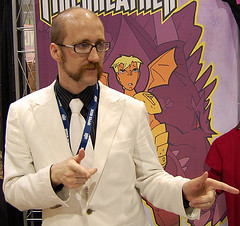
Cornell also loved cosplay, but he interestingly noted that he also liked people on message boards saying how much they hate a series, because at least the series is making them feel something, even if it was negative. “The last thing you want as a writer,” he said, “is no response to a comic.”
When asked about writer’s block, the panel admitted that it didn’t exist. “Courage block,” was what DeConnick called it, while Gillen joked that it was “a prison block for writers who don’t work”. Cornell encouraged everyone to simply keep writing. “You’ll rewrite the words later anyway.” DeConnick agreed, saying “you have to give yourself permission to suck” and encouraged the audience to tattoo it on their neck. Fraction pointed out that you wouldn’t be able to see it, then performed an excellent mime of trying to look at his neck. DeConnick continued undeterred, saying ideas are the easy part, getting them down is the struggle. There are plenty of great potential writers out there, she pointed out, but it’s better to express an imperfect idea than nothing at all.
Fraction’s way of combatting writer’s block was to think of a scene from Ed Wood. When told his film Glen or Glenda was terrible, Wood said that the next one will be better, and that was how he looked at his work.
Block strikes artists too. Aja admitted to drawing 20 pages then trashing them all, and Wacker joked that that was the reason behind the recent delay in Hawkeye releases. Spurrier summed up the feeling by saying “it’s more about inertia than it is about being a block,” to which Gillen characteristically added “you may also just be lazy.”
When asked about the works they are least and most proud of, Cornell talked about a mini-series he wrote, wherein he tried to reinvent an entire character backstory as a sub-plot, while also having a second sub-plot, in four issues. Spurrier said it was trying to be too clever, by playing with time in a one-shot issue when there was no need to do so. A comic she was writing, intended to be about badass ladies kicking ass (my recording didn’t pick up the names, but I believe one of them was Black Widow) was named Steve Rogers and the Secret Avengers, even though Steve wasn’t in it. So she decided to include scenes of Steve, basically sitting behind a desk while the ladies did all the fighting, but in doing this, she ran out of space to develop her villain. So she used the short-hand of “this person is evil” by having the villain kill a dog.
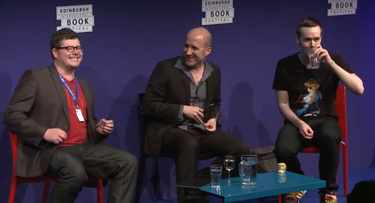
For Perez, it was looking back on old work and noticing mistakes. He spoke of a new release for an old graphic novel of his, where he began re-lettering, then changing dialogue, then art, until eventually he had, in his words, “Lucased it”. Aja too sees issues with his work on the acclaimed Immortal Iron Fist. But maintains that if you created the perfect comic, you wouldn’t want to continue.
The penultimate question returned to the weekend’s recurring joke. When asked for advice for getting into comics:
Spurrier: Kill Jamie McKelvie.
Gillen: Wait until he draws four more pages, then do it.
DeConnick: I feel like I should take him into protective custody.
But in all seriousness, the advice of the panel was basically “do it”. Use the opportunity of events like Thought Bubble to hand out your work. You’ll never get far in comics if you don’t let anyone see your work.
The final question proved the most bizarre. Asked if they ever felt sad feeling a story after a long time working on it, Gillen embarked on a baffling tale about building a cat-flap. This confused DeConnick, as she misheard it as “cat-flat” and thought British people built apartments for their cats. Eventually, Gillen made his point. Finishing a work is satisfying, not necessarily sad.
I only attended ThoughtBubble on the Saturday, so I couldn’t attend the Sunday panels, but I assume Jamie McKelvie is still alive.

 RSS Feed
RSS Feed
